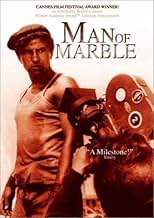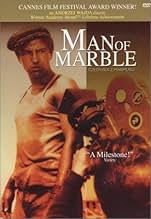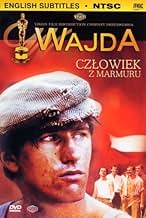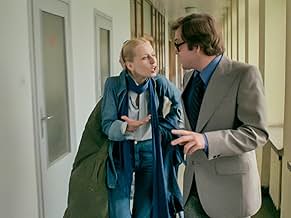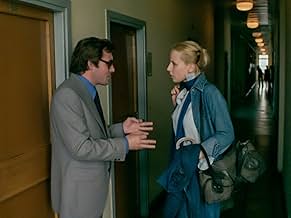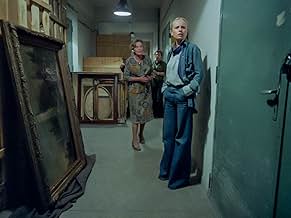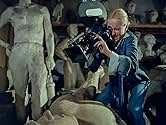NOTE IMDb
7,7/10
5,1 k
MA NOTE
Un jeune cinéaste polonais cherche à savoir ce qu'il est advenu de Mateusz Birkut, un maçon qui est devenu un héros de la propagande dans les années 1950, mais qui est ensuite tombé en disgr... Tout lireUn jeune cinéaste polonais cherche à savoir ce qu'il est advenu de Mateusz Birkut, un maçon qui est devenu un héros de la propagande dans les années 1950, mais qui est ensuite tombé en disgrâce et a disparu.Un jeune cinéaste polonais cherche à savoir ce qu'il est advenu de Mateusz Birkut, un maçon qui est devenu un héros de la propagande dans les années 1950, mais qui est ensuite tombé en disgrâce et a disparu.
- Réalisation
- Scénario
- Casting principal
- Récompenses
- 4 victoires et 1 nomination au total
Avis à la une
Andrzej Wajda has always impressed me, and his war trilogy are among the best and most essential films in the history of cinema, but "Man of Marble" is an ambitious, interesting idea that isn't realized very well in script or in terms of the finished product.
The most interesting aspect of "Man of Marble" outside of the much-examined similarities to "Citizen Kane" is how subversive it is. I wonder how this was ever released in Poland at the time, and the scenes in the film where I felt Wajda really did succeed as a director is where he contrasts Soviet propaganda with the actual events- very powerful. Wajda fails more than he succeeds with this particular film though, it's a disjointed narrative and it takes tremendous skill to keep the audience interested in both stories. Sure, one may argue that "Man of Marble" isn't intended as entertainment, but even in the context of art-house cinema this film is only engaging in parts, with Agnieszka's attempt to make this film ending up far more interesting than the film she's making.
I can see where Wajda is going with the way he shot this film, but it just doesn't work very well, and the score for this film has to be one of the worst matches I've ever come across. It's ludicrous.
Something of a companion piece by the same writer and director, I found "Man of Iron" far more engaging and impressive.
5/10
The most interesting aspect of "Man of Marble" outside of the much-examined similarities to "Citizen Kane" is how subversive it is. I wonder how this was ever released in Poland at the time, and the scenes in the film where I felt Wajda really did succeed as a director is where he contrasts Soviet propaganda with the actual events- very powerful. Wajda fails more than he succeeds with this particular film though, it's a disjointed narrative and it takes tremendous skill to keep the audience interested in both stories. Sure, one may argue that "Man of Marble" isn't intended as entertainment, but even in the context of art-house cinema this film is only engaging in parts, with Agnieszka's attempt to make this film ending up far more interesting than the film she's making.
I can see where Wajda is going with the way he shot this film, but it just doesn't work very well, and the score for this film has to be one of the worst matches I've ever come across. It's ludicrous.
Something of a companion piece by the same writer and director, I found "Man of Iron" far more engaging and impressive.
5/10
'Man of marble' is usually seen as an bold, anti-communist movie which is strikingly accurate at the deep level of practices within communist countries. Indeed, trough a story of a student who tries to make a graduation film Wajda beautifully succeeds in describing at the same time the soft violence of the '70s in Poland and the totally different hardcore 'prison' violence of the Stalinist regime in the 50's. Hence, it is gradually revealed trough the eye of the camera the contrast between the heroic, raw atmosphere of the first communist years and the light perestroika of the present cinematographic time. Nonetheless, there is a common thread throughout the movie as the all-pervading party monopoly deeply affects everybody and no one has the option of an Utopian escape.
The no exit strategy is probably for me the main theme of the movie. The rebellious young girl who tries to see beneath the propaganda images is also on psychoanalytical trip to confront her family history.
There are two scenes which can more or less summaries the story: in the first one, we can see her right at the beginning in a rough quarrel with her Television supervisor, and we can consequently grasp the theme of the incessant conflict with the authority. However, if on the one level wecan see her rejecting the father figure, on the second level we can witness desire as the film maker is practically possessing the hero statue which she finds in a basement of a museum.
Well, basically the catch of the movie is the intertwine of the story with the girl on the way of her desire and the political level which makes this trip also a trip of a historical clearing up. And, in the strange development of we find that the "fake" hero is in fact an authentic one and that we did know the secret of the narrative - the "hero"(the father, the phallus) of the propaganda is the "true" hero, as he had to face real tough moral problems and he lived "the life in truth" . The heroine can develop at last real emotional attachment with the paternal image and she eventually can end her trip by accepting an ally and a friend in the final scene.
The no exit strategy is probably for me the main theme of the movie. The rebellious young girl who tries to see beneath the propaganda images is also on psychoanalytical trip to confront her family history.
There are two scenes which can more or less summaries the story: in the first one, we can see her right at the beginning in a rough quarrel with her Television supervisor, and we can consequently grasp the theme of the incessant conflict with the authority. However, if on the one level wecan see her rejecting the father figure, on the second level we can witness desire as the film maker is practically possessing the hero statue which she finds in a basement of a museum.
Well, basically the catch of the movie is the intertwine of the story with the girl on the way of her desire and the political level which makes this trip also a trip of a historical clearing up. And, in the strange development of we find that the "fake" hero is in fact an authentic one and that we did know the secret of the narrative - the "hero"(the father, the phallus) of the propaganda is the "true" hero, as he had to face real tough moral problems and he lived "the life in truth" . The heroine can develop at last real emotional attachment with the paternal image and she eventually can end her trip by accepting an ally and a friend in the final scene.
I'm surprised that this great film hasn't gotten more comments. In any case, the previous reviews really nail the film pretty well. I only want to add that the filmmaker within the film, Agnieszka (played by Krystyna Janda), is such a fiercely dedicated artist that she really commands our attention in every scene she's in. Sneaky, smart, with a deep cunning and a sly sense of humor, she is the real hero of the film. I love the many scenes where she steals mischievous glances at her co-workers while collecting the provocative material for her film.
Watch for the scene where she kicks her sound man in the shin. Also especially memorable is her encounter with a more successful film director, who she must persuade to be interviewed. She simply walks up to his car, bends down and looks in at him, with a blank expression on her face, and stares at him. It's as if she's persuading him by sheer force of will! Truly a great film, and a great performance.
Watch for the scene where she kicks her sound man in the shin. Also especially memorable is her encounter with a more successful film director, who she must persuade to be interviewed. She simply walks up to his car, bends down and looks in at him, with a blank expression on her face, and stares at him. It's as if she's persuading him by sheer force of will! Truly a great film, and a great performance.
So many film students have wasted their time trying to study "Kane" as a character study and as a satire. But it wasn't really either of those things, but an experiment in depth for the camera and narrative structures. The frequent comparison between that film and this one makes a lot of sense superficially; the newsreel footage, the interviewees made up to look 20 years older.
But Agniezcka is making a film, rather than a piece for a newspaper: journalism vs. art, capitalism vs. socialism. Although the journalists in "Kane" said otherwise, they were never seeing "who he was" rather "what he was like" ie. his behaviour, how others perceived him etc. Here we have something broader, examining a man confronting society, confronting his friends, and confronting himself all at the same time. Newspaper journalism tells us what something is like. Good documentary strives to really define what or who something was.
This is a highly intelligent structure, moreso than his previous works and moreso even than "Kane." As a meditation on film-making, it moves gracefully from the shots captured by Agniezcka's cinematographer, and the shots of Wajda himself, forcing us to draw parallels.
It's a shame Wajda remains largely unknown. Perhaps the up-coming Criterion set of his "War Trilogy" will change that.
4 out of 5 - An excellent film
But Agniezcka is making a film, rather than a piece for a newspaper: journalism vs. art, capitalism vs. socialism. Although the journalists in "Kane" said otherwise, they were never seeing "who he was" rather "what he was like" ie. his behaviour, how others perceived him etc. Here we have something broader, examining a man confronting society, confronting his friends, and confronting himself all at the same time. Newspaper journalism tells us what something is like. Good documentary strives to really define what or who something was.
This is a highly intelligent structure, moreso than his previous works and moreso even than "Kane." As a meditation on film-making, it moves gracefully from the shots captured by Agniezcka's cinematographer, and the shots of Wajda himself, forcing us to draw parallels.
It's a shame Wajda remains largely unknown. Perhaps the up-coming Criterion set of his "War Trilogy" will change that.
4 out of 5 - An excellent film
I first learned of Andrzej Wajda when he won an honorary Academy Award and made his acceptance speech in his native Polish. In the years since, I've watched some of his movies. I've finally seen his "Czlowiek z marmuru" ("Man of Marble" in English). It focuses on a filmmaker (Krystyna Janda) putting together a production about a man (Jerzy Radziwilowicz) who got held up as the paradigm of a heroic Stakhanovite but whose whereabouts are now unknown. Then of course arises the issue of how much she'll be allowed to focus on this man without angering the authorities.
It's safe to say that this movie presaged the rise of the Solidarity movement in its depiction of the workers. Wajda was already inclined to direct independently of the government's confines, and he became one of the most innovative directors of all, along the lines of Stanley Kubrick and Federico Fellini. In the end, this is one that you have to see. I hope to see more of Wajda's movies.
It's safe to say that this movie presaged the rise of the Solidarity movement in its depiction of the workers. Wajda was already inclined to direct independently of the government's confines, and he became one of the most innovative directors of all, along the lines of Stanley Kubrick and Federico Fellini. In the end, this is one that you have to see. I hope to see more of Wajda's movies.
Le saviez-vous
- AnecdotesThe award Burski is flaunting at the airport on his return was Wajda's own award, hence Burski is a mock self-portrait.
- ConnexionsEdited into Sauve la vie (qui peut) (1981)
Meilleurs choix
Connectez-vous pour évaluer et suivre la liste de favoris afin de recevoir des recommandations personnalisées
- How long is Man of Marble?Alimenté par Alexa
Détails
- Durée
- 2h 45min(165 min)
- Couleur
- Mixage
- Rapport de forme
- 1.37 : 1
Contribuer à cette page
Suggérer une modification ou ajouter du contenu manquant


